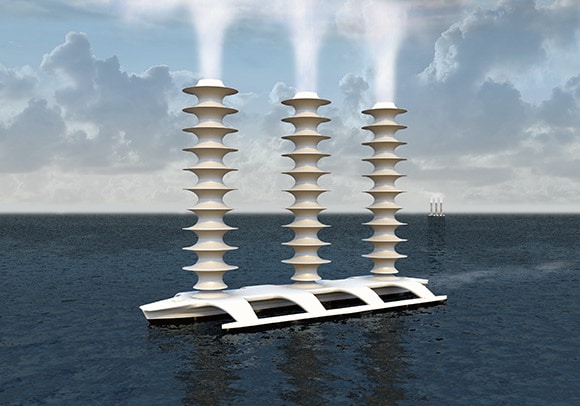Bjorn Lomborg has found a new vocation. For years, the Danish doubter has been hectoring the scientific community about their shoddy understanding of climate science – a discipline he has never published a peer reviewed paper about.
Now he is championing the dangerous prospect of geo-engineering as his latest reason to ignore ballooning carbon emissions. Specifically he believes a fleet of 1,900 robotic ships patrolling the Pacific Ocean churning seawater into the upper atmosphere will negate the need to do anything about climate change.
Problem solved!
This loopy prospect emerged from the Copenhagen Consensus – Lomborg’s personal climate conference where hand-picked attendees parrot his fringe notion that climate change is simply to expensive to deal with. Real economists around the world have come to exactly the opposite conclusion.
And now Lomborg finds himself at odds with actual experts yet again. The same week he was courting press attention for his robot ship solution, a gathering of independent scientists was warning the world about the dangers of relying on geo-engineering instead of emission cuts.
“Playing with the Earth’s climate is a dangerous game with unclear rules,” said Robert Jackson, director of Duke University’s Center on Global Change and organizer of a symposium on geo-engineering at the Ecological Society of America’s Annual Meeting.
“We need more direct ways to tackle global warming, including energy efficiency, reduced consumption, and investment in renewable energy sources. The bigger the scale of the approach, the riskier it is for the environment,” said Jackson.
Strangely, Lomborg’s fleet of robotic ships was not even a topic of discussion at the symposium. Instead researchers focused on the more plausible idea of injecting huge amounts of sulfur particles and other aerosols into the upper atmosphere to reflect sunlight.
While most scientists caution that geo-engineering should only be considered as an emergency response to catastrophic climate change, it might provide temporary reductions in global temperatures. However, they also warn that solar radiation management schemes would do nothing to reduce the ballooning carbon load in the atmosphere or the impending death of coral reefs worldwide due to ocean acidification.
Monkeying around with the world’s thermostat can have other unintended consequences such as endangering the planet’s critically important ozone layer.
“An increase in ozone depletion over the Arctic could lead to dangerous levels of ultraviolet light hitting the Earth’s surface,” said Simone Tilmes of the National Center for Atmospheric Research. “In this case, the recovery of the ozone hole over the Antarctic could be delayed by decades.”
Other researchers warn of drastic and permanent changes to precipitation patterns around the world.
Another geo-engineering scheme involves dumping huge amounts of iron particles into the ocean to stimulate microbial uptake of carbon. The downside? Potentially enormous dead-zones where decay of phytoplankton blooms lead to oxygen-free ocean “deserts” that kill any marine life that swim into them. Researchers also warn that ocean fertilization schemes would only alleviate a fraction of the massive increase in atmospheric carbon from burning fossil fuels.
“Any large-scale fertilization could cause risks to ocean ecosystems as great as those of global warming itself,” warned Charles Miller of Oregon State University.
Meanwhile, in the faux ivory tower of the “Copenhagen Consensus”, Lomborg as usual is arguing that the only sensible course of action is to burn baby burn. His particular brand of celebrity and ignorance remains one of the most unhelpful voices in the urgent discussion of how to deal with climate change.
Subscribe to our newsletter
Stay up to date with DeSmog news and alerts






